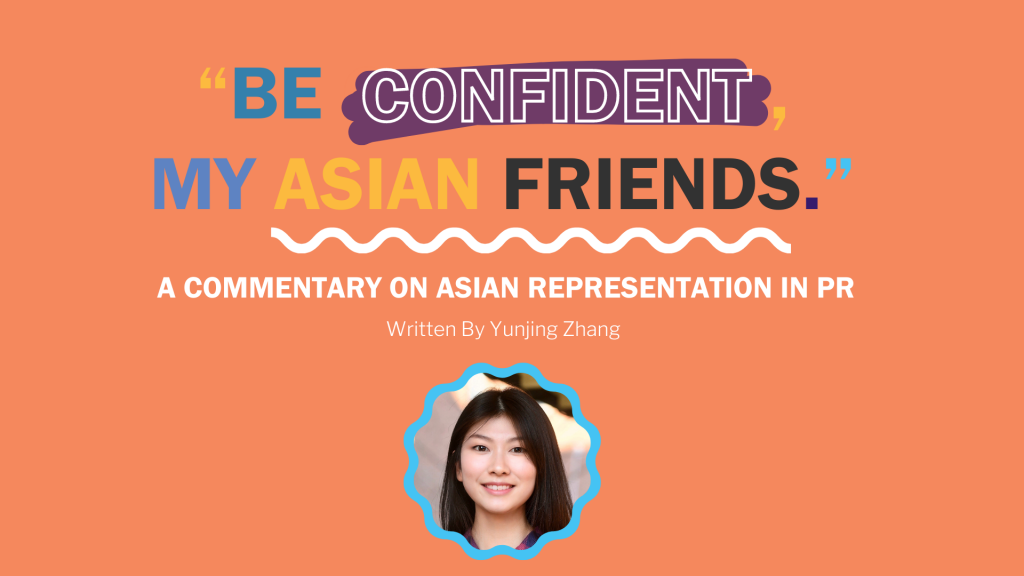“Be confident, my Asian friends.” A Commentary on Asian Representation in PR

As I reflect on Asian American and Pacific Islander (AAPI) Heritage Month, I want to introduce you to another way to think about the #StopAsianHate conversation. I was born in Xi’an, China. Every time I saw a foreigner on the street who looked very different from me, I was genuinely curious about that person’s life story, language, experience and what brought them to my hometown. Even though I was young and knew very few English words, nothing really stopped me or the foreign friend from starting the conversation. We were very open and welcoming to the new things that were not common to us.
The COVID-19 pandemic has caused a disruption of people meeting face to face. People may be getting more introverted with age, and most communications now online/digital while many can be anonymous. Online blog posts and events like a Twitter chat are good ways to explore the world and listen to others.
In April 2021, I launched a Twitter chat, Standing Together: Asian Voices in Communications, which highlighted the voices of people of Asian descent who lived or are living in the U.S. Today, In honor of AAPI Heritage Month, I want to highlight some Asian communications students’ thoughts, including mine, on our representation in the PR industry of the U.S. I will also share my thoughts and what I learned from my Chinese friends who worked in PR in China, as I shared on this PRSSA podcast.
What Asian Students Think About Their Representation in PR
I tried to imagine myself being very successful in the PR field in the U.S. and it was difficult. I asked my Asian American and International PR friends, they resonated with me. Not that we are not confident, but a lot of famous and successful PR people in the real world or on the television do not look like us.
Here are some other thoughts regarding our representation in PR I collected from my Asian friends:
- People have established stereotypes of what PR people should look like, where they are from, and their personalities, etc.
- People of Asian descent are thought to be lacking experience in American culture and the language, English.
- Many Asian students have heard that it is hard for an Asian student to start a PR career in the U.S. so they don’t try.
- Some people of color, including people of Asian descent, are now in high positions in the PR industry. Is their PR expertise being recognized?
What We Think Can Be Improved
People need to know that many Asian Americans are native English speakers and are familiar with the American culture. Language is important but should not be a reason to discriminate or hurt others.
About the expertise concern, check out the 2020 Asia-Pacific PR Agencies of the Decade by Provoke — “Ogilvy’s Asia-Pacific PR unit not only overtook its US earnings, but also held on to top spot in this part of the world despite fierce competition — submitting year after year of growth to nudge towards the $200m mark.”
PR in My Hometown, China
I have not worked in any PR firms in China, but I was able to connect with a few friends who have. Below are what I learned about China’s PR landscape:
- Brainstorms are musts, but most teams will lean toward past and proven methods to warrant results. This also depends on clients and company scale.
- PR and advertising are mixed, similar to marketing and analytics. Most times an account is separated into two teams: social and events.
- Public relations firms in China focus more on experience and expertise than educational background.
- Fact: PR people always work overtime in China.
“The industry in China is less than 30 years old. It has only been within the past 10 years that PR as a discipline has begun to be understood and appreciated by Chinese businesses and stakeholders,” said the executive vice president of Burson Marsteller China, David Zhao, in an interview with PublicAffairsAsia. We can find many similarities among PR firms in China and the U.S. Some of these findings can depend largely on the company we work for. One thing we can be sure about is: “local Chinese PR firms are catching up and aggressively expanding,” said Zhao.
Be confident, my Asian friends. Don’t be limited by the fixed ideology in your head. We can do better than what we think.

Yunjing Zhang is a recent graduate of Pennsylvania State University, University Park. There she majored in Public Relations, minored in Digital Media Trends and Analytics and received a certificate in Business Fundamentals. Zhang was the diversity and inclusion chair at Penn State PRSSA and a PRoud Council member with PRSSA National. Connect with Zhang on LinkedIn and Twitter.
